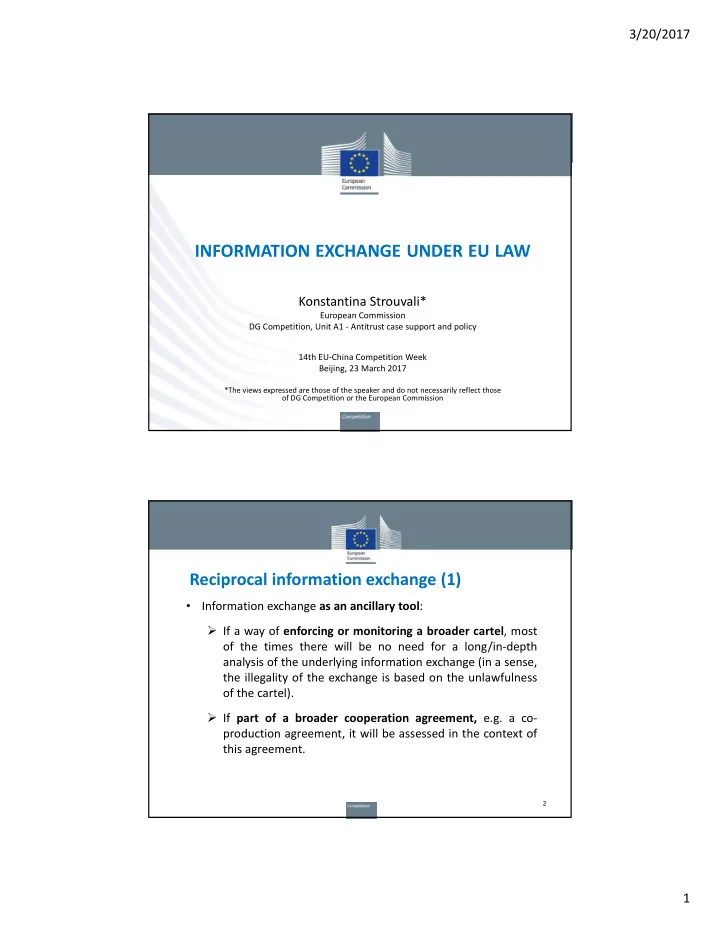

3/20/2017 INFORMATION EXCHANGE UNDER EU LAW Konstantina Strouvali* European Commission DG Competition, Unit A1 ‐ Antitrust case support and policy 14th EU ‐ China Competition Week Beijing, 23 March 2017 *The views expressed are those of the speaker and do not necessarily reflect those of DG Competition or the European Commission Reciprocal information exchange (1) Information exchange as an ancillary tool : • If a way of enforcing or monitoring a broader cartel , most of the times there will be no need for a long/in ‐ depth analysis of the underlying information exchange (in a sense, the illegality of the exchange is based on the unlawfulness of the cartel). If part of a broader cooperation agreement, e.g. a co ‐ production agreement, it will be assessed in the context of this agreement. 2 1
3/20/2017 Reciprocal information exchange (2) Information exchange as an independent infringement : • The exchange may in itself infringe Article 101 of the EU Treaty ( Dole ). The exchange of information can be illegal, even if it is a one time event ( T ‐ Mobile). There might not be a difference to a cartel. Comprehensive guidance in EU Commission‘s Horizontal Guidelines (2010). 3 Agreement or concerted practice? Structured information exchange (system) vs informal • exchanges. Concerted practice: " a form of coordination between • undertakings which, without having reached the stage where an agreement properly so ‐ called has been concluded, knowingly substitutes practical cooperation between them for the risks of competition ’ ( Dyestuffs ). Not necessary to define an information exchange as an • agreement or a concerted practice ( Asnef ‐ Equifax ). 4 2
3/20/2017 By object or by effect restriction? An information exchange can be a by object restriction ( T ‐ • Mobile, „removing uncertainties“ ). See Horizontal Guidelines, in particular § 72 ‐ 74: • Individualised vs aggregated data. Future vs current vs past data. Private intentions vs public information. For an effects analysis, the market characteristics and the • „delta“ brought about by the information exchange will be crucial (see Horizontal Guidelines § 75 ff. and EU Commission‘s UK Tractors case). 5 What about „non ‐ reciprocal“ exchanges? A paradox? • Maybe not: ‘any direct or indirect contact between such • operators, the object or effect whereof is either to influence the conduct on the market of an actual or potential competitor or to disclose to such a competitor the course of conduct which they themselves have decided to adopt or contemplate adopting on the market’. (Sugar) (Rebuttable) presumption that conduct will follow (Anic). • No defence for lack of effects, but public distancing. • Relevance, among others, for signalling and hub and spoke. • 6 3
3/20/2017 Public announcements and signalling Generally, a unilateral announcement or an exchange of public • information is unlikely to constitute an infringement. Is the announcement a genuine unilateral act? • " Strategic response " and " readjustment " to competitors' announcements. Is the announcement about genuinely public information? • Exchange on individual intentions reduces strategic uncertainty between competitors without incurring commercial risk. EU Commission Horizontal Guidelines § 63, 99. • Container shipping (Commission), Mobile telephony (Dutch ACM). • 7 Hub and spoke • Information exchanged between competitors through a “hub”/intermediary. • Existence of a vertical link ( ebooks ) vs facilitator scenarios ( AC Treuhand ). • VM Remonts : Could the undertaking ‘ reasonably have foreseen ’ that its service provider would share its commercial information with its competitors? 8 4
Recommend
More recommend